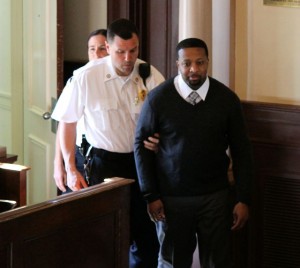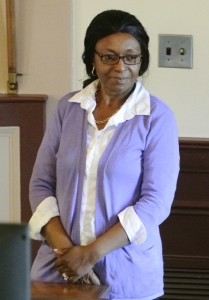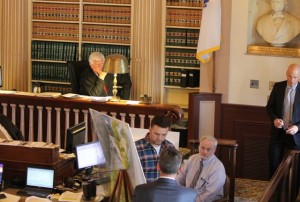
CCB MEDIA PHOTO
Quoizel Wilson is led into court. He is on trial for first degree murder in the death of Trudie Hall in 2010.
BARNSTABLE – Quoizel Wilson’s fate is now in the jury’s hands.
Twelve jurors began deliberations yesterday afternoon. They will determine whether Wilson is guilty or innocent of the 2010 murder of Trudie Hall.
Wilson, 36, is accused of first degree murder in the shooting of Hall, who was 23 years old and lived on Nantucket at the time of the crime. By Wilson’s own admission, Hall was pregnant with his child when she went missing.
The prosecution contends that the murder was committed with deliberate premeditation and extreme atrocity or cruelty.
Besides first degree murder, the jury will decide two other charges, assault and battery with a dangerous weapon and improper disposal of a body.
If they reject first degree murder, the jury must consider second degree murder.
Testimony in the case began last week and over the course of four days, the jury heard from 35 witnesses.
They also heard from the defendant himself who agreed to be recorded when he spoke to police in the days after Hall disappeared.
Barnstable Superior Court Judge Gary Nickerson told the jury yesterday that it is their job to weigh the evidence. A determination of guilt must be decided unanimously and the standard is beyond a reasonable doubt.
Until such time as Wilson is found guilty, Nickerson said, the defendant is to be presumed innocent.

MERRILY CASSIDY/CAPE COD TIMES POOL
Barnstable Superior Court Judge Gary Nickerson shows a photo of Trudie Hall from a PowerPoint presentation given by a cell phone expert who testified in the trial. The judge did not allow the photo into evidence.
“The burden of proof is on the prosecutor. The defendant is entitled to the benefit of the doubt. It is not enough for the commonwealth to establish a probability. That is not enough,” Nickerson told the jury.
In his closing statement to the jury yesterday morning, First Assistant District Attorney Michael Trudeau said, “Remember, this is a search for the truth.”
He offered the jury what he called, “highlights from the chain of evidence that wraps the defendant and binds him with proof beyond a reasonable doubt.”
Trudeau said that while the prosecution does not have to prove a motive, Wilson, a married man, had one: the fact that Trudie Hall was pregnant with his child and she had decided to have the baby, even though Wilson had given her money for the morning after pill. In addition, Wilson testified that he was paying Hall $1,000 per month.
Trudeau told the jury that Wilson had “the means, the opportunity and the motive to commit the murder of Trudie Hall.”
Referring to testimony gathered through the witnesses he brought before the jury, Trudeau told the jury that cell phone evidence showed that Hall’s phone was with Wilson’s phone in the commuter lot off Route 6 where her abandoned rental car was found, and the phones were together on the Service Road near the Barnstable shooting range where police believe Wilson murdered Hall. Later that night, the phones were together in the wooded area where Hall’s body was found.
Wilson told police that he had his phone with him the entire night in question.

MERRILY CASSIDY/CAPE COD TIMES POOL
Vivienne Walker, Trudie Hall’s mother, looks at the jury before her testimony Wednesday. She was the first witness on the stand in the trial of Quoizel Wilson.
Evidence of Hall’s murder, including her blood and bullet fragments, was in her rental car found by police in the commuter lot.
The mileage on Hall’s rental car was also consistent with it being driven from Hyannis to Falmouth and back.
The morning after the crime, cell phone records showed Hall’s phone was at the Allied Waste facility in Rochester at the same time as work records showed Wilson picked up his truck for his job as a garbage man for Allied.
“I suggest you take the evidence that is proven and draw reasonable and logical conclusions,” Trudeau said. He added that sometimes circumstantial evidence can be more compelling than direct evidence.
Defense attorney Robert Galibois, in his closing statement, took the jury through each of the prosecution’s witnesses and pointed out what he said were holes in the case against his client.
He said Wilson had no motive to kill Trudie Hall and there was no evidence of him wanting to harm her.
He pointed the jury to other men in the case, especially Steven Newcomb, whose fingerprint was on Hall’s rental car. Newcomb had testified that he touched the car briefly while exiting a convenience store in Hyannis and had no knowledge of anyone involved with the case.
“Steven Newcomb is a person in this case,” Galibois said.
Galibois also pointed to Mawande Senene, who lived in Yarmouth at the time of the crime and had been a friend of Wilson’s. Senene initially lied to police but then changed his story, saying that Wilson had wanted him to provide an alibi but he refused to provide that alibi.

CCB MEDIA PHOTO
Bryan Despres testifies as to where he found a skull in the woods off Hayway Road in East Falmouth in 2012. The discovery of Trudie Hall’s remains came a year and a half after she disappeared.
Galibois said evidence surrounding Newcomb and Senene were not pursued aggressively enough by police.
Galibois also pointed to Wilson’s wife, Donna McKenzie Wilson, as someone of interest in the case. Hall’s mother, Vivienne Walker, testified that a woman claiming to be the wife of a man that Trudie Hall was having an affair with had made a “slander-ish” phone call concerning Hall in the month before the murder.
Galibois said he believed the prosecution made an error in implying the murder scene was the Barnstable shooting range since Wilson’s key to the site would have been invalid at the time of the crime.
Police have not found the murder weapon and Galibois emphasized that there is no forensic evidence linking his client to the crime. “It is not possible. It is not probable,” he said.
With regard to what actually happened, he referred to comments of a former judge in saying about such cases, “You won’t know until you hear the entire case and even then, you may not know.”
The sequence of events that came to the jury through evidence beginning one week ago started with Hall’s mother, Vivienne Walker, reporting her daughter’s disappearance to Yarmouth Police on July 28, 2010.
Hall had come to the Cape the previous day from Nantucket with her husband, Ram Rimal.
Rimal was flown in from Kathmandu, Nepal to testify for the prosecution.
Rimal told the jury that he and Hall were staying the night on the Cape, because they had an early morning appointment in Boston on July 28. They took two separate rooms at the Bayside Resort in West Yarmouth and in the morning when it was time to leave for the appointment, Hall was nowhere to be found.
Wilson became a suspect early on and police questioned him several times in the days after Hall was reported missing.
The first time was late on July 28 and into the early morning hours of July 29 when Wilson’s wife was nearby. At that time, Wilson denied that he had an intimate relationship with Hall.
But Wilson later contacted police and met with them to tell them that he was having an affair with Hall and was likely the father of her unborn child.
Police taped that interview and the prosecutor, Trudeau, referred to it prominently in his closing arguments.
Trudeau pointed out that while Hall’s body had not yet been located, Wilson referred to her in the past tense, saying “she would have been five months pregnant” and “we used to see each other twice a week.”
“Why is he talking in the past tense? Because he already knows she’s dead,” Trudeau said.
During that interview, Barnstable Police Sergeant John York pointed out that Wilson did not seem concerned about Hall.
Trudeau said, Wilson’s response was, “Yeah, I’m worried. I’m worried about how things are looking for me.”
The jury decided to end their deliberations for the day yesterday at 4 p.m. and will continue this morning at 9 a.m.
By LAURA M. RECKFORD, CapeCod.com News Editor
























